Lessons in Justice: Bush’s European Nightmare
One week ago you were justified in believing once United States President George W Bush levered congressional approval for his war against Iraq, and member states of the United Nations Security Council had complied to US pressure to hawk-up resolutions, that Britain and the USA would spark a pre-emptive strike against Baghdad.
But there’s another crucial forum that can potentially pause United States war plans – at least for a time. Clearly the Bush Administration has been issued legal advice that a pre-emptive strike against Iraq at this time would contravene international law and conventions protecting human rights. Could George Bush be tried for war crimes? Yes.
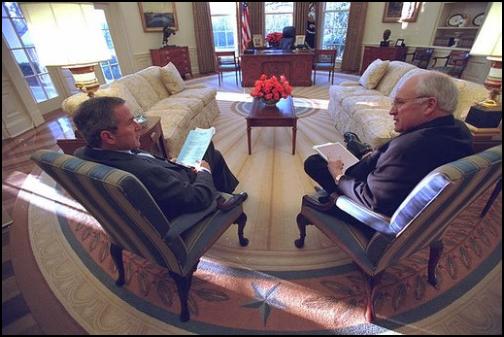
Could George Bush and Dick Cheyney be dragged from the Whitehouse’s inner sanctum to face trial by an international criminal court for war crimes? At the moment, yes!
The recently established International Criminal Court is a headache that will not leave Bush.
And over this past two weeks, the American President has directed diplomats to hammer out a deal, demand from the Europeans who preside over the court the total exemption “for all Americans” from ever being tried.
If Bush is successful “The American People” United States soldiers, politicians, and the President, will be exempt from being tried for war crimes, international crimes, and crimes against humanity.
This past week has seen United States diplomats sent like missionaries to 15 European states that sway power within the ICC.
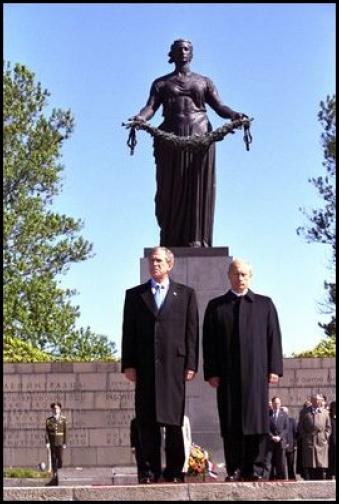
Will George Bush get Russian President Putin to comply?
On October 8 a top US State Department envoy, Ambassador Marissa Lino, left for Europe. Her task: to try to persuade “several governments” to ignore a recent European Union compromise on the international criminal court that would exempt only “some Americans” from prosecution.
The European Union member states had already agreed that individual member states could write exempt certificates stating that charges could not be made against US nationals for atrocities allegedly committed on their soil.
The EU foreign ministers sought United States appeasement after tensions soared during the German September Elections where its then foreign minister was reported as likening George W Bush to Hitler. Chancellor Gerhard Schroeder issued a “sorry George” letter to Bush but the US claimed it was more an explanation than an apology.
With appeasement the goal, but the EU in a deadlock, a European-block compromise was sought: on one side Germany sought a level playing field, and ethic of legal egalitarianism. The opposing team had Italy, vying for US trade, pushing the US line for full exemption for all United States citizens.
A compromise passed: exempting United States military personnel, and diplomats from being tried for international crimes, including crimes against humanity and war crimes, by the International Criminal Court.
The Whitehouse barked at the decision, rejected it, President Bush said the compromise didn’t go far enough.
Bush immediately dispatched Marissa Lino to London, then to Paris, Madrid and Rome to try to ensure that “no Americans” would ever be prosecuted by the International Criminal Court. Bush wants a total exemption going all the way to the top.
Is this just another example of PAX Americana in action? See… Scoop article Imperial PAX Americana… Yes, clearly, but the motive of self-preservation is also obviously paramount.
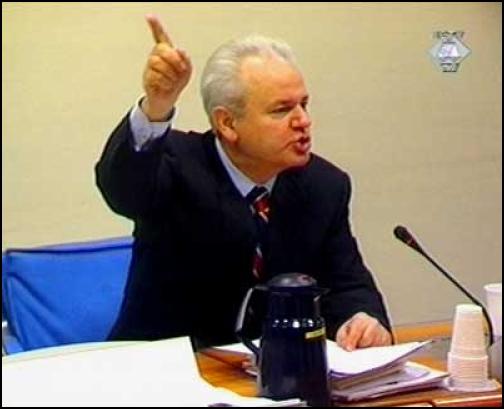
Other Presidents such as former Serb leader Slobadan Milosevic have refused to accept the jurisdiction of International Law. Will the USA be exempt from this order? If so, does this add weight to Milosevic’s defence?
The Whitehouse is wary that such a court – the ICC specifically was set up to bring individuals to justice, including heads of state, presidents like Slobadan Milosevic, for crimes against humanity. Should global discord mount against the US post a new Iraq-US war, the President himself, Colin Powell and a host of others potentially could stand trial for war crimes resulting from the Administration’s pre-emptive strike policy.
Whitehouse legal teams and scores of diplomats have been working around the clock moving to erase the ICC risk from the Iraqi war equation. The stand off is an unexpected blur on the Whitehouse, West Wing, Situation Room’s war map. It’s the unknown factor in a game of Chess where fears are harboured that international justice could return a verdict of guilty placing George W Bush alongside Slobodan Milosevic and Klaus Barbie in the records of history.
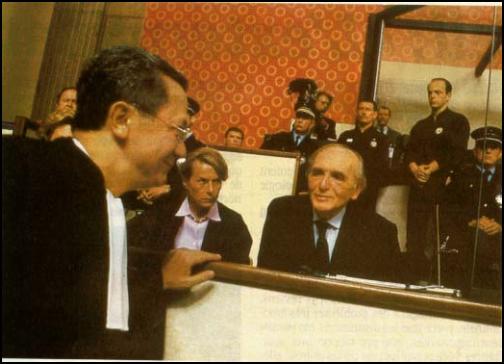
America will refuse to allow its President to be tried like Klaus Barbie, the Butcher of Lyon.
Bush wont have it.
With a groundswell of anti-USA fervour generating around the globe, President Bush has much to worry about.
Domestically, support for war has been syphoned off with news that the US economy is gravely ill and that the costs of war will deliver hardship to “The American People”.
The United Nations General Assembly is fast becoming a hot-bed of former conservatism. It has forced the Security Council to hear views of the “wider UN membership” on Wednesday [New York time]. Certainly, a War resulting from eventual Iraq non-compliance of UN weapon inspection resolutions would likely be tolerated. Pre-emptive air-strikes on Baghdad committed by the United States, Britain, Italy and Turkey would be another matter.
And pre-emptive ‘defence’ is the stated plan. It’s stated in the National Security Strategy blueprint issued by Bush on September 23 New Zealand time. See… National Security Strategy of the United States of America.
Bush said last Thursday [October 10 2002:] “With tonight's vote in the United States Senate, America speaks with one voice. The Congress has spoken clearly to the international community and the United Nations Security Council. Saddam Hussein and his outlaw regime pose a grave threat to the region, the world, and the United States. Inaction is not an option, disarmament is a must."
But George Bush Senior certainly will have advised Junior to be cautious. George Senior was indicted in 1991, came close but for no established Court of Law with the actual jurisdiction to enforce it.
Both realise, for Junior, there is now the ICC.
In May 11 1991, after the Gulf War singed to its conclusion, Ramsey Clark, who served as US Attorney General in the administration of Lyndon Johnson, convened over an International War Crimes Tribunal complaint charging: George Bush, Dan Quayle, James Baker, Richard Cheney, William Webster, Colin Powell, Norman Schwarzkopf and a handful of others with “Crimes Against Peace, War Crimes, Crimes Against Humanity and Other Criminal Acts and High Crimes in Violation of the Charter of the United Nations, International Law, the Constitution of the United States”.
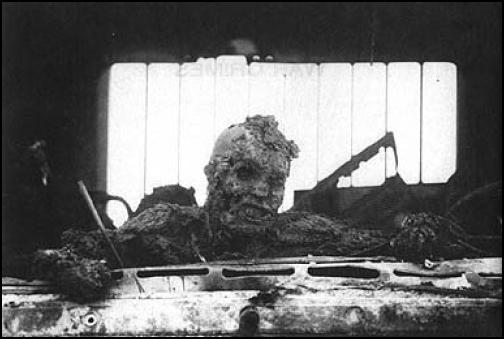
At a hearing in New York, the tribunal heard former Attorney General Ramsey Clark outline a 19-point indictment of the US government's conduct in the Gulf War. For seven hours eyewitnesses who had travelled to Iraq during and following the war presented evidence on the extensive and deliberate destruction of Iraq's infrastructure.
Compelling video testimony was shown. Images of destroyed neighbourhoods, shrapnel and burn victims, dehydrated and undernourished children in hospitals lacking electricity and necessary drugs were displayed in the photo exhibit.
Click here to view the: 19-point indictment…
The International War Crimes Tribunal in New York heard evidence detailing human rights abuses that abandoned signed and agreed upon conventions detailing what is legally permissible in a theatre of war.
Much of the evidence centred on the "Highway of Death," a name the press gave to the road from Mutlaa, Kuwait, to Basra, Iraq.
There, United States aircraft crushed convoys by destroying vehicles at the front and rear of the convoy line, blocking the road. Then, for hours, the United States began bombing all the vehicles and occupants that were stationary in the resulting traffic jams.
In 1992, Clark wrote that more than 2,000 vehicles and tens of thousands of charred and dismembered bodies littered the 60 miles of highway.
“The clear rapid incineration of the human beings suggests the use of napalm, phosphorus, or other incendiary bombs,” he said.
“These are anti-personnel weapons outlawed under the 1977 Geneva Protocols. This massive attack occurred after Saddam Hussein announced a complete troop withdrawal from Kuwait in compliance with UN Resolution 660. Such a massacre of withdrawing Iraqi soldiers violates the Geneva Convention of 1949, common article 3, which outlaws the killing of soldiers who ‘are out of combat.’ There are, in addition, strong indications that many of those killed were Palestinian and Kuwaiti civilians trying to escape the impending siege of Kuwait City and the return of Kuwaiti armed forces. No attempt was made by U.S. military command to distinguish between military personnel and civilians on the ‘highway of death.’ The whole intent of international law with regard to war is to prevent just this sort of indiscriminate and excessive use of force,” Ramsey Clark wrote. For more see… http://www.deoxy.org/wc/warcrime.htm See also… the Francis A. Boyle, Professor of Law, University of Illinois, report on the War Crimes Complaint.
While the hearing committee ruled that the 19 point indictment was justified, and recommended that those charged with the crimes be considered before the United Nations, those named listed were obviously never tried.
Clearly in war, the United States and its peoples are not immune from committing war crimes. The current Bush Administration simply refuses to be tried for them. To comply is abhorrent to the American scheme of things.
Non-compliance is not new to the United States. As a nation the USA has refused to comply with previous International Court rulings.
For example on April 9 1984 Nicaragua filed against the USA to the UN International Court at the Hague requesting the US take responsibility for military and paramilitary activities in and against Nicaragua. The Court ruled that the United States immediately “cease and refrain” from any action restricting access to Nicaraguan ports, and in particular the laying of mines.
The Court also ruled that Nicaragua, like any other State, should be fully respected and should not be “jeopardized by activities contrary to the principle prohibiting the threat or use of force and to the principle of non-intervention in matters within the domestic jurisdiction of a State”.
On 27 June 1986, the Court delivered a Judgment that the United States had violated the obligations imposed by customary international law and had violated certain obligations arising from a bilateral Treaty of Friendship, Commerce and Navigation of 1956, and that it had committed acts such to deprive that treaty of its object and purpose. The Court decided that the United States “must make reparation for all injury caused to Nicaragua”.
The United States maintained its refusal to take part in the case. In September 1991, Nicaragua informed the Court, inter alia, that it did not wish to continue the proceedings. The United States told the Court that it welcomed the discontinuance and, by an Order of the President dated 26 September 1991, the case was removed from the Court's List.
The United States was clearly acting
like a nation on the run, dodging the felony until the
victim and indeed the court exhausted attempts to enforce
justice.
But
the International Criminal Court would by-pass a nation’s
identity and seek to identify, arrest, hold in custody, and
try alleged criminals – it has the authority to enforce it.
The Whitehouse’s spokesperson Ari Fleischer admitted to
journalists in July that the ICC already has the power to do
so.
“American People” would be tried for crimes such
as these: only last year, scores, if not hundreds, of
Taliban prisoners of war suffocated to death inside metal
cargo containers where they were imprisoned after
surrendering to Northern Alliance and US forces in the
Afghan city of Kunduz in late November. The Taliban
prisoners, mostly foreign volunteers from Pakistan, died of
asphyxiation and injuries inside the airtight shipping
containers during a two or three day journey to a prison in
the town of Sheberghan. The details of the deaths were
reported in the New York Times.
Article 3 of the
Geneva Conventions prohibits “violence to life and person,
in particular murder of all kinds, mutilation, cruel
treatment and torture,” of prisoners of war. Moreover
Article 20 mandates that the “evacuation of prisoners of war
shall always be effected humanely.” The same article
requires that “the Detaining Power shall supply prisoners of
war who are being evacuated with sufficient food and potable
water, and with necessary clothing and medical attention”
and “take all suitable precautions to ensure their safety
during evacuation.”
Should the United States military
commanders be brought to trial for allowing such
acts?
Their President says no.
Whitehouse spokesperson Ari Fleischer was asked on July 3 2002: “What the President said yesterday was that he didn't want to see American soldiers or diplomats dragged into this court [the International Criminal Court].”
Ari Fleischer: “That's correct.”
The journalist further asked: “Are we seeking immunities for American diplomats in the Security Council? Or is that part of peacekeeping?”
Ari Fleischer: “The Security Council is focused on the peacekeepers, but there is a broader concern about civilians who could similarly be targeted arbitrarily by the International Criminal Court for prosecution, even as a non-participating nation. Our concern applies, as we've said I think last week, to both military, peacekeeping elements in the military, as well as to civilians, which, of course, would include diplomats.
On August 12, US State Department deputy spokesperson, Philip T. Reeker, said: “The United States is committed to effective action against war crimes and crimes against humanity. We very much respect states that have acceded to their own statute, creating the International Criminal Court. We respect their sovereign decision to do so. But we hope they'll respect our decision not to accede to that statute, and we hope they'll respect our decision to avail ourselves of the procedure made available by the statute to prevent our nationals from falling into the potentially highly politicized jurisdiction of that Court.
“And so that is what we have been pursuing with many countries around the world, and that's the nature of the discussions here in Washington, as well as through our embassies overseas,” Reeker said.
He was further asked at what level the arm-twisting was occurring: “A variety of levels -- staff directors. There are also teams that will visit countries overseas. So it's involved most countries throughout the course of our normal diplomatic business,” Reeker said.
The arm-twisting continues: the New York Times reported last week that John R. Bolton, the under secretary of state for arms control and international security and the Bush Administration's point man for the court, travelled to London and Paris last week to urge those governments to sign broad exemption clauses.
The NY Times said this was to be signed “before the United States takes any military action against Iraq”. “But expectations for immediate success are muted, especially after the United States failed in a recent attempt to have American peacekeepers automatically exempted during the annual review of NATO's rules of engagement for the Balkan peacekeeping operations.”
Bush now has Congress on his side. He’s got the Senate. He has England, Italy, Turkey. He’s working hard on Russia, China, members of the UN Security Council. He will be “patient”, as he continues to remind us.
Bush says: “For more than a decade, Saddam Hussein has deceived and defied the will and resolutions of the United Nations Security Council by, among other things: continuing to seek and develop chemical, biological, and nuclear weapons, and prohibited long-range missiles; brutalizing the Iraqi people, including committing gross human rights violations and crimes against humanity; supporting international terrorism; refusing to release or account for prisoners of war and other missing individuals from the Gulf War era; refusing to return stolen Kuwaiti property; and working to circumvent the UN's economic sanctions.”
Without action,
Bush says, the people of Iraq will continue to live in
brutal submission. The regime will have new power to bully,
dominate, and conquer its neighbours, condemning the Middle
East to more years of bloodshed and fear. The region will
remain unstable, with little hope of freedom, and isolated
from the progress of our times.
“If we act, we can see a
very different future. The people of Iraq can shake off
their captivity. They can one day join a democratic
Afghanistan and a democratic Palestine, inspiring reforms
throughout the Muslim world. These nations can demonstrate
that honest government, and respect for women, and the great
Islamic tradition of learning can triumph in the Middle East
and beyond,” George Bush says.
Facts have yet to be determined.
But unless Bush can be assured he’ll personally get through this US-Iraq war ‘a free man’, be personally exempt from standing trial before all nations, the cowboy’s gun will likely remain cocked, ready to smoke. The military-might of the globe’s sole superpower will stand poised.
EU ministers are under pressure. PAX Americana is a powerful beast.
Should power remain within the guiding principles of the International Criminal Court’s original charter? Should the governing ideal be: every citizen must be determined to be equal in law and in rights, irrespective of his or her origin?
Think about it: if the EU bows to United States pressure and creates one international law for “The American People’ and another for all other ‘sub-humans’ would that be a crime, a silly but sad indictment against the moral guidance entrusted to this planet’s human rights custodians?
As history shows, entries answering such questions are always written by the conqueror’s pen.


 Richard S. Ehrlich: Deadly Border Feud Between Thailand & Cambodia
Richard S. Ehrlich: Deadly Border Feud Between Thailand & Cambodia Gordon Campbell: On Free Speech And Anti-Semitism
Gordon Campbell: On Free Speech And Anti-Semitism Ian Powell: The Disgrace Of The Hospice Care Funding Scandal
Ian Powell: The Disgrace Of The Hospice Care Funding Scandal Binoy Kampmark: Catching Israel Out - Gaza And The Madleen “Selfie” Protest
Binoy Kampmark: Catching Israel Out - Gaza And The Madleen “Selfie” Protest Ramzy Baroud: Gaza's 'Humanitarian' Façade - A Deceptive Ploy Unravels
Ramzy Baroud: Gaza's 'Humanitarian' Façade - A Deceptive Ploy Unravels Keith Rankin: Remembering New Zealand's Missing Tragedy
Keith Rankin: Remembering New Zealand's Missing Tragedy